March 1927
| << | March 1927 | >> | ||||
|---|---|---|---|---|---|---|
| Su | Mo | Tu | We | Th | Fr | Sa |
| 1 | 2 | 3 | 4 | 5 | ||
| 6 | 7 | 8 | 9 | 10 | 11 | 12 |
| 13 | 14 | 15 | 16 | 17 | 18 | 19 |
| 20 | 21 | 22 | 23 | 24 | 25 | 26 |
| 27 | 28 | 29 | 30 | 31 | ||
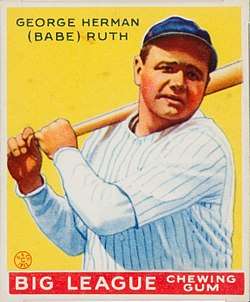
March 2, 1927: Babe Ruth signs for record salary
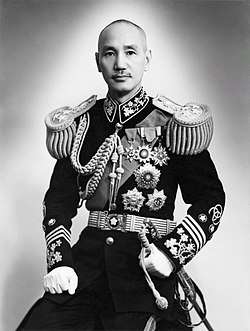
March 26, 1927: Chiang Kai-shek captures Shanghai
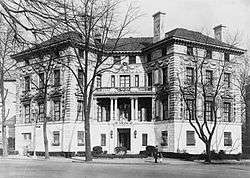
March 2, 1927: Coolidge and family move into U.S. presidential residence
The following events occurred in March 1927:
March 1, 1927 (Tuesday)
- U.S. President Calvin Coolidge and his family spent their final night in the White House, which was set for six months of repairs on the roof and the upper floor. The following day, the family took up residence at the Patterson Mansion on 15 Dupont Circle, owned by Mrs. Ellinor Schlesinger. President Coolidge continued to use the executive offices at the White House.[1]
- An explosion at a coal mine in Cwm, Wales, a coal mine explosion killed 52 miners.[2]
- Born:
- Harry Belafonte, African-American singer (Day-O), in New York City
- Robert Bork, American judge, rejected candidate for the U.S. Supreme Court, in Pittsburgh (d. 2012).
- Died: George Polley, 28, American daredevil who climbed skyscrapers from the outside under the billing "The Human Fly". Polley, who had risked death on numerous occasions, died in Richmond, Virginia, during an operation at Memorial Hospital for a brain tumor.[3]
March 2, 1927 (Wednesday)
- Babe Ruth signed a new contract with the New York Yankees, calling for a then-record salary of $70,000 per year.[4] The next best paid Yankee player was Herb Pennock, at $17,500 Wayne Stewart,[5]
- The discovery, by teenagers Frank Horton Jr. and Leonard Taylor, of high grade gold ore in Nevada, set off a modern-day gold rush that attracted thousands of prospectors to the area.[6] The town of Weepah, Nevada sprang up near Tonopah. Within three months, the rush was over, and the Weepah was almost totally deserted by August.[7]
March 3, 1927 (Thursday)
- A violent cyclone struck the island of Madagascar, with winds at more than 125 mph. An 8-foot high storm surge washed over the city of Tamatave, killing almost 600 people, and numerous ships in the harbor were driven inland.[8]
- Archaeologist George Andrew Reisner and a group of explorers opened the tomb of Queen Hetepheres I, the mother of the builder of the Great Pyramid, and found that the sarcophagus was empty.[9]
- Born:Pierre Aubert, President of Switzerland (Swiss Federal Council) in 1983 and 1987, in La Chaux-de-Fonds (d. 2016)
- Died: J. G. Parry-Thomas, 42, British auto racer, at Pendine Sands, while trying to set a new automobile speed record. His world record of 171.02 mph had been broken on February 4 by Malcolm Campbell.[10]
March 4, 1927 (Friday)
- In South Africa, near Potchefstroom, the government permitted a race for the staking of claims for diamond mining at the Grasfontein farm. With the firing of a gun as a signal, 25,000 "peggers" (prospectors) "ran nearly three miles over hummocky broken ground, then set to work feverishly to stake as much of the best territory as possible".[11]
- Born: Dick Savitt, American tennis player, in Bayonne, New Jersey; Wimbledon and Australian Open champion, 1951
- Died: Ira Remsen, 81, American chemist, who in 1879 discovered saccharin by accident
March 5, 1927 (Saturday)
- Notre Dame defeated Creighton University, 31-17, to finish the 1926-27 college basketball season with a record of 19 wins and one loss. The Helms Athletic Foundation later recognized the Notre Dame as the mythical national champion in a 1941 poll.[12]
- General Motors introduced the LaSalle, a smaller and more maneuverable luxury automobile.[13]
March 6, 1927 (Sunday)
- At Battersea, Bertrand Russell delivered his famous address, "Why I Am Not a Christian".[14]
- San Francisco police shot and mortally wounded Celsten Eklund, a known anarchist and wounded another man as they attempted to light the fuse to a large dynamite bomb in front of the Saint Peter and Paul Catholic Church.
- Born:
- Gabriel García Márquez, Colombian author, in Aracataca; author of One Hundred Years of Solitude, Nobel Prize in Literature laureate, 1982 (d. 2014)
- Gordon Cooper, American astronaut on Mercury 9 (1963) and Gemini 5 (1965) (d. 2004)
- Wes Montgomery, American jazz guitarist, in Indianapolis (d. 1968)
- William J. Bell, American TV producer, creator of The Young and the Restless and The Bold and the Beautiful, in Chicago (d. 2005)
March 7, 1927 (Monday)
- At 6:28 pm local time, an earthquake measuring 7.6 on the Richter magnitude scale struck on Japan's Tango Peninsula in the Kyoto Prefecture. The tremors and subsequent fires killed 3,020 people, and destroyed the cities of Toyooka and Kinosaki in the Hyōgo Prefecture.[15]
- In the case of Nixon v. Herndon, the United States Supreme Court declared unconstitutional a Texas law that barred African-American voters from participating in primary elections,[16] rendering similar laws in other states void. The victory was short-lived, as Texas passed a new law that gave political parties the right to set their own rules for participation in a party primary election. Such laws were not held unconstitutional until the April 1, 1946 ruling in Primus v. King.[17]
March 8, 1927 (Tuesday)
- The first downhill skiing race in the United States took place at Mount Moosilauke in New Hampshire, and was won by Charles N. Proctor of Dartmouth College.[18]
- Singer Jimmie Rodgers, celebrated later as "The Father of Country Music", recorded his first hit single, The Soldier's Sweetheart.[19]
March 9, 1927 (Wednesday)
- Signed on September 23, 1926, the 1926 Slavery Convention, officially the Convention to Suppress the Slave Trade and Slavery, entered into force.[20]
- A neutrality pact was signed between Latvia and the Soviet Union, but was not ratified. A subsequent, and weaker, non-aggression pact was finally signed on February 5, 1932. The Republic of Latvia was incorporated into Soviet Union in 1940.[21]
- American balloonist Hawthorne C. Gray set an unofficial altitude record of 8,230 meters (27,000 feet) over Belleville, Illinois, but passed out in the thin air, regaining consciousness only after the balloon descended on its own. Gray would reach 12,945 meters on May 4, a record that would fail because he parachuted from the craft (at 3,830 m) landing. On November 4, he reached 12,192 meters but did not survive the trip.[22]
- Adolf Hitler made his first public speech after the Bavarian government lifted a two-year ban against his participation in political events.[23]
March 10, 1927 (Thursday)
- Zenith Radio Corporation became the first company to obtain a license from RCA to manufacture radios, followed on May 18 by the Crosley Radio Corporation.[24]
March 11, 1927 (Friday)
- The first armored car robbery was committed by Paul Jaworski and the Flatheads Gang near Pittsburgh, Pennsylvania. The gang set off explosions to disable two cars that were transporting cash for the payroll for the Terminal Coal Company, and escaped with more than $104,000.[25]
- In New York City, the Roxy Theater was opened by Samuel Roxy Rothafel. With 5,920 seats, it was the largest cinema built up to that time.[26]
- Born:Ron Todd, British trade union leader; President of TGWU 1985-92; in Walthamstow, London (d. 2005)
March 12, 1927 (Saturday)
- The Kreta Ayer Incident in Singapore turned much of the Chinese community in the British colony against the colonial administration. Demonstrators, observing the anniversary of the death of Sun Yat-sen, were fired upon by police after stopping in front of a precinct station at Kreta Ayer, and six people were killed.[27]
- Outside the Bolshoi Theatre in Moscow, and assassination attempt was made against Soviet Politburo member Nikolai Bukharin. The Soviets claimed that the failed crime had been the work of British intelligence agents, and a group of "counterrevolutionaries" were executed on June 9, 1927. In 1938, Bukharin himself was accused of plotting against the government and was executed.[28]
- The adventure film The Beloved Rogue starring John Barrymore was released.
- Born: Emmett Leith, co-inventor of the hologram, in Ann Arbor (d. 2005)
March 13, 1927 (Sunday)
- The leadership of the Kuomintang voted to fire Chiang Kai-shek from most of his executive positions, except for commander of expeditionary forces. Generalissimo Chiang ignored the demotion and, after capturing Shanghai two weeks later, took absolute control over the Kuomintang.[28]
- Born:
- Raúl Alfonsín, 49th President of Argentina (1983–89), in Chascomús, Buenos Aires (d. 2009)
- Robert Denning, American interior designer (d. 2005)
March 14, 1927 (Monday)
- Jigme Wangchuck was formally crowned as King of Bhutan, under the authority of the British protectorate.[29]
- Igor Stravinsky finished the score for the opera Oedipus Rex.[30]
- Died: Jānis Čakste, 67, first President of Latvia and in office since 1922; he was succeeded by Gustavs Zemgals
March 15, 1927 (Tuesday)
- Shōwa financial crisis: In Tokyo, the large Watanabe Bank failed a day after Finance Minister Naoharu Kataoka mistakenly said in a speech that the struggling bank had "at last collapsed" and depositors made a bank run, withdrawing their cash. Two other banks collapsed by the end of the week and by March 24, twelve banks had crashed and more would follow.[31]
- Born: Carl Smith, American country musician, in Maynardville, Tennessee (d. 2010)
March 16, 1927 (Wednesday)
- The Intelligent Woman's Guide to Socialism and Capitalism was completed by George Bernard Shaw.[32]
- Born:
- Vladimir Komarov, Soviet cosmonaut and first human to die during a space mission, in Orenburg ( killed 1967) in re-entry of Soyuz 1
- Daniel Patrick Moynihan, U.S. Senator (D-N.Y.), 1977–2001, in Tulsa, Oklahoma (d. 2003)
- Georges Séguy, leader of the France's CGT labour union; in Toulouse (d. 2016)
March 17, 1927 (Thursday)
- As the Teapot Dome scandal continued to unravel, Harry F. Sinclair, owner of Mammoth Oil Company (later Sinclair Oil), was convicted by a jury of contempt of Congress. The multimilloniare eventually served a six-month prison term in 1930.[33] On the same day, President Coolidge issued an executive order returning administration of all naval petroleum reserves from the U.S. Department of Interior to the U.S. Department of the Navy.[34]
- More than one-hundred people died when the Chinese ship Chongfu was wrecked in the Yangtze River near Luzhou in the Sichuan Province.[35]
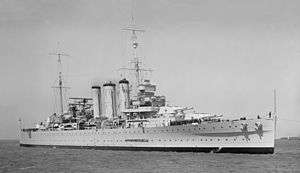
HMAS Australia
- The Royal Australian Navy cruiser HMAS Australia was launched at Clydsbank, Scotland. It would be commissioned in 1928.[36]
- Born: Roberto Suazo Córdova, President of Honduras from 1982 to 1986
- Died: Charles Emmett Mack, 26, American silent film actor, in an auto accident
March 18, 1927 (Friday)
- In the Northern Expedition: Generalissimo Chiang Kai-shek's Nationalist forces arrived at the defensive line protecting the city of Shanghai. Instead of defending against the enemy, the garrison commander collaborated with the Nationalists, as well as handing over the plans for city's defense. Though offered a position with Chiang's forces, the officer who betrayed his commander declined to work further with them. One author wrote later, "Stupidly, he went home to Shandong, where he was executed[37]
- A tornado leveled the town of Green Forest, Arkansas, killing 16 people and injuring more than 50. In all, 26 people were killed in the storm.[38]
- Born: George Plimpton, American sportswriter (Paper Lion), in New York City (d. 2003)
March 19, 1927 (Saturday)
- Balto, the Siberian husky who would later become the subject of an animated 1995 film (Amblin Entertainment), was given a parade and a hero's welcome in Cleveland, along with six of his canine teammates (Fox, Sye, Billy, Tillie, Moctoc and Alaska Slim). Businessman George Kimble had rescued the animals, two years after the 1925 serum run to Nome, after finding that they were being neglected. Gay Salisbury and Laney Salisbury, The Cruelest Miles: The Heroic Story of Dogs and Men in a Race Against an Epidemic (W. W. Norton & Company, 2005) p253;[39]
- Born:
- Allen Newell, pioneering computer programmer, in San Francisco (d. 1992)
- Richie Ashburn, American MLB player and Hall of Fame enshrinee, at Tilden, Nebraska (d. 1997)
March 20, 1927 (Sunday)
- In Mahad, Dr. Babasaheb Ambedkar began a crusade for the end of discrimination against the Dalit caste in India, known commonly as "Untouchables".[40]
- Albert Snyder, a 44-year-old art editor for the magazine Boating, was brutally murdered at his home on 222nd Street in Queens, New York, and his wife, Ruth Snyder, was discovered bound and gagged. A few days later, police arrested Ruth and her lover, Judd Gray, for Albert's murder. After their trial and conviction, Mrs. Snyder and Mr. Gray would both be executed on January 12, 1928.[41]
- Born: John Joubert, British composer, in Cape Town, South Africa
March 21, 1927 (Monday)
- Northern Expedition: As the Nationalist Chinese troops of Chiang Kai-shek approached Shanghai, Chinese Communist Party leader Zhou En-lai led the Shanghai Uprising to aid Generalissimo Chiang. A strike was called and 600,000 workers left their jobs. Rebels then seized police stations and armories, cut power and telephone lines, and obeyed Zhou's orders to not harm foreigners in the city.[42]
- Born: Hans-Dietrich Genscher, Vice-Chancellor of West Germany and the nation's Foreign Minister from 1974 to 1990; following reunification with East Germany, Genscher would serve as Vizekanzler and Foreign Minister until May 17, 1992; in Reideburg (d. 2016)
March 22, 1927 (Tuesday)
- At a meeting at the Biltmore Hotel in New York, Zionist leader Chaim Weizmann and a supporter from the Jewish community, attorney Louis Marshall, reached an agreement to fund a survey of Palestine and the "Holy Land". A commission headed by Lee Frankel delivered its report later in the year.[43]
- Forty-three Russian peasants, on their way to church in Orenburg, drowned when their ferry boat sank.[44]
- Died: Charles Sprague Sargent, 85, creator of the Arnold Arboretum in Boston.
March 23, 1927 (Wednesday)
- Nanking Incident: After the troops supporting Shanghai's warlords retreated to Nanking, Nationalist troops pursued, and attacks on foreigners began. Six foreign residents, including Professor John E. Williams of Nanjing University, were killed.[45]
- Died: Paul César Helleu, 67, French painter
March 24, 1927 (Thursday)
- Nanking Incident: After six foreigners had been killed in Nanjing and it appeared that Kuomintang troops would overrun the foreign consulates at Nanjing, the American consul, John K. Davis, asked for military intervention.[46] The American destroyers USS Noa and USS Preston, and the British cruiser HMS Emerald, fired shells into the Chinese city to clear the streets, then dispersed the attackers with gunfire.[47]
- Born:
- Martin Walser, German author, in Wasserburg am Bodensee
- Gerald D. Aurbach, American biochemist, in Cleveland (d. 1991)
March 25, 1927 (Friday)
- The Japanese aircraft carrier Akagi was commissioned into the Imperial Japanese Navy. After taking part in the 1941 attack on Pearl Harbor, the Akagi was damaged and sunk six months later at the Battle of Midway.[48]
- Nanking Incident: After a day of shelling Nanking, the United States and Britain agreed to a one-day ceasefire in return for the Kuomintang allowing the hundreds of foreigners in the city to be safely evacuated.[49] Six foreigners, three of them British, had been killed by Chinese forces. Chinese histories estimate that there were more than 2,000 Chinese casualties from the bombardment.[50] The French Communist newspaper Communite reported that 7,000 Chinese had been killed in the bombardment of Nanjing, while the U.S. State Department placed the total number of deaths and injuries "at less than 100".[51]
- Born:
- Bill Barilko, Canadian NHL player for Toronto Maple Leafs, in Timmins, Ontario (killed in plane crash, 1951)
- Leslie Claudius, Indian field hockey star and three time Olympic gold medalist (d. 2012)
March 26, 1927 (Saturday)
- Marshal Chiang Kai-shek, Commander in Chief of the Cantonese armies, captured Shanghai "without firing a shot", and arrived at the city on the gunboat Zhongshan, after sailing from Hankou. At the French Concession, Chiang met with local political and business leaders, who pledged their financial support if he would end his alliance with the Communists who had helped him gain control of the city.[52]
March 27, 1927 (Sunday)
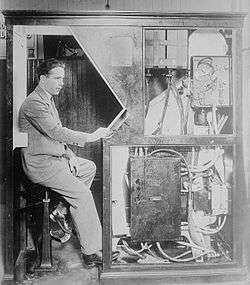
Josepho and the Photomaton booth
- Anatol Josepho, a 31-year-old Russian who had arrived in the United States penniless in 1925, became a millionaire with the sale of the rights to his invention, the photo booth, to the newly organized Photomaton Corporation.[53]
- Henry Ford, at the time the world's wealthiest man, was hospitalized after he struck a tree. The auto magnate had been driving his coupe it was run off the road by a larger Studebaker on Michigan Avenue in Detroit. Reports of the crash were kept from the press for several days[54] and the matter was later investigated as "an attempted assassination",[55] but the case was later dropped.[56] Researcher Jim Morris concluded that the accident was the motivating reason for the inclusion of safety glass in all Ford automobiles thereafter.[57]
- Born:
- Mstislav Rostropovich, Russian cellist and conductor, in Baku, Azerbaijan SSR, USSR (d. 2007)
- Anthony Lewis, Pulitzer Prize–winning journalist, in New York City (d. 2013)
- Died:
- Joe Start, 84, American first baseman from 1871 to 1886
- William Healey Dall, 81, American naturalist
- Will H. Dilg, 56, American conservationist
March 28, 1927 (Monday)
- The Majestic Theatre opened in New York with the production Rufus LeMaire's Affairs. The Broadway theatre would premiere numerous successful plays and musicals, including Carousel, South Pacific, The Music Man, Camelot, The Wiz, and Andrew Lloyd Webber's The Phantom of the Opera, which has played at the Majestic since 1988.[58]
- Died: Alfred Klausmeyer, 66, co-founder and operator of the Anchor Buggy Company, which had been the world's largest manufacturer of horse-drawn carriages from 1887 until 1915.[59]
March 29, 1927 (Tuesday)
- Henry Segrave became the first person to drive a car at more than 200 miles per hour, reaching 203.79 in the 1000 horsepower Sunbeam Mystery. Racing on the sands of Daytona Beach, Florida, broke Malcolm Campbell's world record, set in February 1927, by almost 30 miles per hour.;[60]
- Hubert Wilkins and Ben Eielson became the first persons to make an airplane landing on a floating icepack, after having engine trouble. Landing in the Arctic Ocean, further north than any previous airplane had been, Wilkins and Eielson made their repairs and took off again, flew back south, made another forced descent onto ice, and had to hike ten more days across the ice to return to the shores of Barrow, Alaska.[61]
- Born:
- John McLaughlin, American political commentator (The McLaughlin Group), in Providence, Rhode Island (d. 2016)
- John Robert Vane, British pharmacologist and 1982 Nobel Prize laureate, in Tardebigge, Worcestershire (d. 2004)
March 30, 1927 (Wednesday)
- Shōwa financial crisis: Following the worst financial panic in that nation's history, Japan's Diet passed an emergency banking law, the Ginko Ho, immediately increasing the amount of capital that banks were required to keep in reserve. As a result, the number of banks decreased over the next five years from 1,417 to 680[62] and Japan's five largest banks (Mitsui, Mitsubishi, Sumitomo, Yasuda and Dai-Ichi) doubled their share of the nation's deposits, from 17% to 31%.[63]
- Coal mine explosions in Pennsylvania and Illinois killed five and eight miners respectively, but hundreds more were rescued the next day after being trapped underground. At Ehrenfeld, Pennsylvania, it appeared that nearly 500 miners had been trapped, but all but five came out the next day.[64] An explosion the same day near Ledford, Illinois trapped 300 men, but all but 8 were saved.[65]
- Died: Ladislas Lazaro, 54, U.S. Congressman (D-La.) since 1913
March 31, 1927 (Thursday)
- At midnight, members of the United Mine Workers of America began a strike of American bituminous coal mines after the expiration of their 1924 contract with union mines, with 200,000 miners across the United States walking off of their jobs.[66] Coal mining continued with strikebreakers, and the strike came to an end on July 18, 1928.[67]
- Vladimir K. Zworykin received British Patent No. 255,057 for an all cathode ray television system. U.S. Patent No. 1,691,324 was issued on November 13, 1928.[68]
- Born:
- César Chávez, American labor leader, founder of United Farm Workers; in Yuma, Arizona (d. 1993)
- William Daniels, American film and television actor (voice of KITT in Knight Rider; Dr. Mark Craig in St. Elsewhere); in Brooklyn
gollark: I see. I don't think I am ever in situations where I could have a smartwatch but not a phone.
gollark: It doesn't take very long to retrieve a phone from a pocket. You could even bind different types of message to different sounds or vibration patterns on it if it mattered much.
gollark: Plus biometrics, but those don't seem useful either.
gollark: You basically just get to read notifications slightly faster and recharge it constantly, at great expense.
gollark: I know some people with "Apple Watches" and stuff, but they don't actually seem very useful.
References
- "Coolidges Move to New Residence", Milwaukee Sentinel, March 3, 1927, p1
- "Fifty-two Miners Believed Killed in Wales Explosion", Miami Daily News, March 1, 1927, p1
- "Illness Fatal to Human Fly— Richmond Man Succumbs After Frequently Courting Death", Baltimore Sun, March 3, 1927, p9
- "'Bambino' Agrees To Sign Contact", Pittsburgh Press, March 2, 1927, p1
- Babe Ruth: A Biography (Greenwood Publishing Group, 2006) p81
- "Flivvers Lead in Gold Rush", Miami Daily News, March 5, 1927, p1
- Mary Ellen Glass and Al Glass, Touring Nevada: A Historic and Scenic Guide (University of Nevada Press, 1983), p205; GhostTowns.com
- "500 DEAD IN MADAGASCAR CYCLONE", Miami Daily News, March 5, 1927, p1; Pierre Van Den Boogaerde, Shipwrecks of Madagascar (AEG Publishing Group, 2008) p263
- Peter Lacovara, The Pyramids, the Sphinx, Tombs and Temples of Giza (Bunker Hill Publishing, Inc., 2004), p52
- "British Auto Racer Killed" , Miami Daily News, March 3, 1927, p1; Bluebird-Electric.net
- "25,000 Diamond Diggers at Work", Miami Daily News, March 5, 1927, p1
- Notre Dame 2008-09 Media Guide; "Notre Dame Irish Lose Two Games In Two Years", Massillon (OH) Evening Independent, March 10, 1927, p11; ESPN College Basketball Encyclopedia: The Complete History of the Men's Game (Random House, Inc., 2009) p240
- Motoera website; Vincent Curcio, Chrysler: The Life and Times of an Automotive Genius (Oxford University Press US, 2001) p352
- Bertrand Russell, Why I Am Not a Christian: and other essays on religion and related subjects (Simon and Schuster, 1957) p3
- "Japan's Dead and Injured in Quake May Total 5,000", Miami Daily News, March 8, 1927, p1; Yoshitaro Takenobu, ed. , The Japan Year Book 1929 (1930) p33; USGS Historic Earthquakes Archived 2013-01-14 at the Wayback Machine
- "Supreme Court Upholds Right of Negro Vote", Miami Daily News, March 7, 1927, p1
- Steven F. Lawson, Black ballots: voting rights in the South, 1944-1969 (Lexington Books, 1999) p28
- "Snapshots in Time", Skiing Heritage Journal June 2007 p16
- "Good-bye, Kenny Rogers, Hello, Wagoneers", by Nick Tosches, Texas Monthly October 1988 p118
- Zehra F. Kabasakal Arat, Human rights worldwide: a reference handbook (ABC-CLIO, 2006) p124
- Valdis O. Lumans, Latvia in World War II (Fordham University Press, 2006) p36
- Davis, Jeffrey R.; Johnson, Robert; Stepanek, Jan; Fogarty, Jennifer A. (2008). Fundamentals of Aerospace Medicine. Philadelphia, PA: Lippincott Williams & Wilkins. p. 6. ISBN 978-0-7817-7466-6.
- Douglas G. Morris, Justice imperiled: the anti-Nazi lawyer Max Hirschberg in Weimar Germany (University of Michigan Press, 2005) p244
- Gleason L. Archer, Big Business and Radio (1939, reprinted by READ Books, 2007) p17
- Fran Capo and Scott Bruce, It Happened in Pennsylvania (Globe Pequot, 2005) p82; "Bandits Dynamite Armored Pay Car and Take $104,250", New York Times, March 12, 1927, p1
- Richard Alleman, New York: The Movie Lover's Guide (Random House, Inc., 2005) p133
- C.F. Yong and R.B. McKenna, The Kuomintang movement in British Malaya, 1912-1949 (Singapore University Press, 1990) p88
- Bruce A. Elleman, Moscow and the Emergence of Communist Power in China, 1925-30 (Taylor & Francis, 2009) p111
- Awadhesh Coomar Sinha, Himalayan kingdom Bhutan: tradition, transition, and transformation (Indus Publishing, 2001) p77
- David Ewen, Music for the Millions - the Encyclopedia of Musical Masterpieces (READ BOOKS, 2007) p561
- Norio Tamaki, Japanese banking: a history, 1859-1959 (Cambridge University Press, 1995) pp 150-151
- Gareth Griffith, Socialism and Superior Brains: The Political Thought of Bernard Shaw (CRC Press, 2002) p112
- Gerald S. Greenberg, Historical encyclopedia of US independent counsel investigations (Greenwood Publishing Group, 2000) p316
- Fiftieth Annual Report of the Director of the Geological Survey (Government Printing Office, 1929) p70
- "100 Chinese Die In Wrecked Ship", Miami Daily News, March 18, 1927, p1
- Royal Australian Navy webpage for HMAS Australia (II)
- Jonathan Fenby, Chiang Kai Shek: China's Generalissimo and the Nation He Lost (Carroll & Graf, 2003) p142
- "Toll of 26 Lives Taken in Storms in South, Miami Daily News, March 19, 1927, p1
- "No More Mushing For Balto", Oakland Tribune, March 31, 1927, p20
- Narendra Jadhav, Untouchables: My Family's Triumphant Escape from India's Caste System (University of California Press, 2007) pp37-39
- Landis MacKellar, The "double indemnity" Murder: Ruth Snyder, Judd Gray, and New York's Crime of the Century (Syracuse University Press, 2006) p3; "Art Editor Found Slain in Home and House Ransacked", Montreal Gazette, March 21, 1927, p2
- Jonathan D. Spence, The Search for Modern China (W. W. Norton & Company, 1991) p353; Gao Wenqian, Zhou Enlai: The Last Perfect Revolutionary : A Biography; translated by Peter Rand and Lawrence R. Sullivan (PublicAffairs, 2007) p55
- Melvin I. Urofsky, American Zionism from Herzl to the Holocaust (University of Nebraska Press, 1995) p328
- "Peasants Going To Church Drown", Miami Daily News, March 23, 1927, p1
- "Nanjing (Nanking) Incident, China, (1927)", in The War of 1898, and U.S. Interventions, 1898-1934: An Encyclopedia (Taylor & Francis, 1994) p356; "MANY AMERICANS KILLED, WOUNDED IN ATTACK OF CHINESE AT NANKING" Miami Daily News, March 24, 1927, p1
- John Van Antwerp MacMurray, How the peace was lost: the 1935 memorandum, Developments affecting American Policy in the Far East(Hoover Press, 1992) p93
- "U.S. and British Warships Shell Cantonese Army", Miami Daily News, March 24, 1927, p1; "Warship's Shells Come Just In Time to Avoid Massacre, Refugees from Nanking Say", Miami Daily News, March 27, 1927, p1
- Paul E. Fontenoy, Aircraft Carriers: An Illustrated History of Their Impact (ABC-CLIO, 2006) p212
- "ALLIES DELAY BOMBARDING OF NANKING FOR DAY AS FOREIGNERS BEGIN LEAVING", Miami Daily News, March 24, 1927, p1
- Arnold Xiangze Jiang, The United States and China (University of Chicago Press, 1988) p83
- "Communist Paper Reports 7,000 Killed at Nanking", Miami News, March 29, 1927, p2
- Frederic E. Wakeman, Policing Shanghai, 1927-1937 (University of California Press, 1996) p123; Zhaojin Ji, A History of Modern Shanghai Banking (M.E. Sharpe, 2003) p157
- "Photo-in-slot Inventor Will Endow Genius", Miami Daily News, March 28, 1927, p15
- "Henry Ford Slightly Injured in Automobile Collision", Miami Daily News, March 30, 1927, p1
- "FORD ASSAILANT HUNTED SECRETLY", Miami Daily News, March 31, 1927, p1
- "Ford Accident Case Dropped By Officials", Miami Daily News, April 3, 1927, p17
- Peter Winnewisser, The Legendary Model A Ford: The Ultimate History of One of America's Great Automobiles. (Krause Publications, 2006) p11
- Louis Botto, At this theatre: 100 years of Broadway shows, stories and stars (Hal Leonard Corporation, 2002) p249-250
- Rebecca Goodman, Barrett J. Brunsman, This Day in Ohio History (Emmis Books, 2005) p316
- "Segrave Smashes World Records; Speedster Sets Mark of 203.841 in Daytona Test", Miami Daily News, March 29, 1927, p1 MDN 3-29-27 Bluebird-Electric.net
- Vilhjalmur Stefansson, Unsolved Mysteries of the Arctic (Ayer Publishing, 1972) p330-332
- Takafusa Nakamura and Kōnosuke Odaka, eds., Economic history of Japan, 1914-1955 : a dual structure (Oxford University Press, 2003) p154
- Kent E. Calder, Strategic Capitalism: Private Business and Public Purpose in Japanese Industrial Finance (Princeton University Press, 1995) p28
- "500 MEN ENTOMBED BY MINE BLAST", Miami Daily News, March 30, 1927, p1; "350 Escape Death in Mine Explosion;", New York Times, March 31, 1927, p24
- "8 Killed, 300 Escape From Illinois Blast", Berkeley (CA) Daily Gazette, March 30, 1927, p1
- "45,000 MINERS STRIKE HERE", Pittsburgh Press, April 1, 1927, p1
- Philip S. Foner, History of the Labor Movement in the United States: The T.U.E.L., 1925-1929 (International Publishers Co, 1991) pp23-29
- Albert Abramson, Zworykin: Pioneer of Television (University of Illinois Press, 1995) p70, 227
This article is issued from Wikipedia. The text is licensed under Creative Commons - Attribution - Sharealike. Additional terms may apply for the media files.